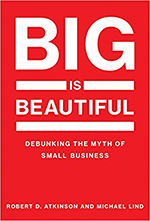 |
Why does Big Business get such a bad rap? A better question: Why does small business enjoy such positive PR, portrayed as the engine of job growth and the symbol of all that’s good with American capitalism?
The April issue of The Atlantic has an excerpt from “Big is Beautiful: Debunking the Myth of Small Business,” which was written by Robert Atkinson and Michael Lind.
The authors tick off some reasons why Big Business is “the object of almost universal scorn,” including Enron’s “accounting chicanery,” Goldman Sachs’s “manipulation of derivative markets,” and globalization that “turned American corporations into multinational enterprises with interests that do sometimes counter to those of their home country.”
Small business, in contrast, stands as the “exemplar of American ingenuity and pluck,” the “rare hero championed by both sides of the yawning political divide” that separates Republicans and Democrats.
To Atkinson and Lind, admiration for small business “is rooted in anachronistic ideals passed down from the nation’s preindustrial founding.”
On the flip side: “the reflexive disdain for large businesses exaggerates their malfeasance while misapprehending their vital role in continued American success.”
While critics like Massachusetts Senator Elizabeth Warren rail against corporate concentration, Atkinson and Lind note the percentage of manufacturing industries in which the top four companies accounted for at least half of total shipments increased only from 35 to 39 percent from 1952 to 2007.
Big companies pay higher tax rates, spend more on R&D, salaries/benefits and create more jobs (“though the depredations of a few job cutters have earned Big Business a reputation for heartless streamlining”) than small firms.
Working Americans face many challenges, but turning them into shopkeepers, artisans or members of the gig economy is not that answer. The authors note that the richest parts of America and abroad are areas where self-employment is lowest.
Atkinson and Lind believe the ability of Big Business to buy influence in Washington via a battery of lobbyists, PR, PA and government relations firms may be why people hold it in low esteem.
They note, however, that small business has its own lobby on K Street through representation in trade groups and associations.
General Motors president Charles Wilson famously told Congress in 1952: “I thought what was good for the country was good for General Motors and vice versa.”
Atkinson and Lind believe a dynamic economy requires interaction of firms of all sizes. “To flourish in the 21st Century, we must learn again that big can be beautiful, too,” they wrote.


 Republican tough guys Josh Hawley and Tom Cotton want Biden to send the National Guard to Columbia University to put an end to student protests... Bernie blasts Bibi for insulting America's intelligence by equating criticism of Israel's government with antisemitism... German court convicts former financial PR exec who claims he wasn't aware that trading on tips is illegal.
Republican tough guys Josh Hawley and Tom Cotton want Biden to send the National Guard to Columbia University to put an end to student protests... Bernie blasts Bibi for insulting America's intelligence by equating criticism of Israel's government with antisemitism... German court convicts former financial PR exec who claims he wasn't aware that trading on tips is illegal.  Southern governors claim they know what's best for their working class, and it's not pay raises... A Ukrainian human rights group played a key role in convincing House Speaker Mike Johnson to hold a vote to send arms to Ukraine, Israel and Taiwan... Trump Media & Technology Group blames short-selling and not lousy outlook for its stock slump.
Southern governors claim they know what's best for their working class, and it's not pay raises... A Ukrainian human rights group played a key role in convincing House Speaker Mike Johnson to hold a vote to send arms to Ukraine, Israel and Taiwan... Trump Media & Technology Group blames short-selling and not lousy outlook for its stock slump. The techniques deployed by OJ Simpson's defense team in the 'trial of the century' served as a harbinger for those used by Donald Trump... People worry about the politicization of medical science just as much as they fret about another pandemic, according to Edelman Trust Barometer... Book bans aren't restricted to red states as deep blue Illinois, Connecticut and Maryland challenged at least 100 titles in 2023.
The techniques deployed by OJ Simpson's defense team in the 'trial of the century' served as a harbinger for those used by Donald Trump... People worry about the politicization of medical science just as much as they fret about another pandemic, according to Edelman Trust Barometer... Book bans aren't restricted to red states as deep blue Illinois, Connecticut and Maryland challenged at least 100 titles in 2023. The NBA, which promotes legalized gambling 24/7, seems more than hypocritical for banning player for placing bets... Diocese of Brooklyn promises to issue press release the next time one of its priests is charged with sexual abuse... Truth Social aspires to be one of Donald Trump's iconic American brands, just like Trump University or Trump Steaks or Trump Ice Cubes.
The NBA, which promotes legalized gambling 24/7, seems more than hypocritical for banning player for placing bets... Diocese of Brooklyn promises to issue press release the next time one of its priests is charged with sexual abuse... Truth Social aspires to be one of Donald Trump's iconic American brands, just like Trump University or Trump Steaks or Trump Ice Cubes. Publicis Groupe CEO Arthur Sadoun puts competition on notice... Macy's throws in the towel as it appoints two directors nominated by its unwanted suitor... The Profile in Wimpery Award goes to the Ford Presidential Foundation for stiffing American hero and former Wyoming Congresswoman Liz Cheney.
Publicis Groupe CEO Arthur Sadoun puts competition on notice... Macy's throws in the towel as it appoints two directors nominated by its unwanted suitor... The Profile in Wimpery Award goes to the Ford Presidential Foundation for stiffing American hero and former Wyoming Congresswoman Liz Cheney.


 Have a comment? Send it to
Have a comment? Send it to 
No comments have been submitted for this story yet.